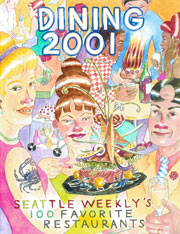COMING-OF-AGE NOVELS nudge me back to a place where I can relive a few of those awkward firsts. They serve as reminders that as an adult I’ve left something valuable behind, a heightened curiosity and awareness of the kind that reigned supreme in Judy Blume’s teen classic Are You There, God? It’s Me, Margaret. Margaret’s anticipation of her physical changes, her childhood’s end, and the lining-up of her boyfriends still resonates as one of the most honest depictions of preadolescent angst—probably because when I read that funny, sympathetic book as a third-grader, I couldn’t believe someone would actually let me in on all those mysteries and celebrate them at the same time.
Buxton Spice
by Oonya Kempadoo (Dutton, $21.95)
Margaret, had she grown up in Guyana instead of the East Coast, would certainly have found a kindred spirit in Lula, a girl fascinated by treetops, the things between people’s legs, and “bubbies,” respectively. In Buxton Spice, Oonya Kempadoo’s debut novel, Lula’s world—which up until now has centered on her family, friends, and the ability to climb a dizzying variety of trees—expands as her body turns into a sensual-pleasure receptor. Her narrative voice, thickened with Creolized English, confronts the nether regions of the human male with sass and intelligence, a combination of schoolgirl giggles and clinical assessment: “Never seen a big man’s lolo, much less one this huge,” she says near the beginning of the book, as a local crazy man sexually assaults her family’s piano. Lula begins to wonder what a “lolo” might have to do with her own anatomy; she keeps track of the bulges in men’s pants and acts out that taboo union, playing “Wife and Husband” with her girlfriends.
Lula introduces her village, Tamarind Grove, in a series of lists. “I got to know all the secrets of the house—like I knew all the trees in the yard,” she says, beginning with her family’s home and the many trees she climbs for their different fruits, degrees of shade, and vantage points. The Buxton Spice tree, which scrapes menacingly against the bathroom window, “was the one tree I didn’t like,” she confesses. “It knew too much.” She envies her older sisters, who perch in its limbs 30 feet up and eat its mangoes. In not equating this exclusion with being on the cusp of adulthood, Lula grants the Buxton Spice the same sinister powers as Eden’s Tree of Knowledge.
Tamarind Grove boasts a population of—among others—four madmen, two spinsters, three prostitutes, a gaggle of horny young men, and (thanks to colonialism) a racially explosive mixture of black, Indian, and Portuguese families. In the 1970s, when the novel takes place, Guyana begins to sag under the weight of its independence from Britain, and becomes a cooperative republic. Then there is a ban on imported goods and “everything is a shortage.” People wait in lines for cooking oil and laundry soap. Children aren’t allowed outside after dark. Gunshots and rapes occur with more and more regularity. As a girl who knows the outside world as “Away,” and whose educated parents hold British passports and support the opposition party covertly, Lula senses that her country, like her body, is on the brink of something new and terrifying. When a local boy touches her in a way she’s never experienced, the moment of surprise sends her into confusion. “I was still quaking frigid . . . but didn’t want the feeling to stop.”
Sex—that forbidden, desirable, and almost palpable act—simmers beneath the surfaces as Lula moves toward even more private knowledge and away from her closest friends. In Kempadoo’s gifted hands, Lula’s powers of observation lend a bewitching tenderness to this chronology; every person, every gesture, becomes infused with meaning. The heavy air, the mud and hot asphalt under her feet, and even the tree limbs between her legs contribute to Lula’s sexual readiness. The Act itself carries connotations of danger, violence, and shame—all things that Lula mulls over as one of the local prostitutes walks through town. “She always added something to the rich languor of the afternoon that even I could recognize,” she ruminates. “Something that held the edge of night.” Kempadoo guides her along the emotionally complex path toward self-discovery, never letting us forget for too long that sexual impulses, like the sweetest tree fruits, take time to ripen.







